Dell – FedEx Supply Chain (formerly GENCO) 28 May 2024 3:43 PM (last year)
Dell’s story began with a belief and a passion: that everybody should have easy access to the best technology anywhere in the world. That was in 1984 in Michael Dell’s University of Texas dorm room. Today, Dell Technologies is instrumental in changing the digital landscape the world over. Dell is among the world’s leading technology companies helping to transform people’s lives with extraordinary capabilities.
GENCO (now part of FedEx Supply Chain Services) was considered a pioneer and market leader in reverse logistics, providing triage, test and repair, remarketing and product liquidation solutions. GENCO offered a complete range of product lifecycle logistics® services to customers in the technology, consumer, industrial, retail, and healthcare markets.
In 2007 Dell participated in UT’s research on Vested outsourcing. In 2010, Dell sent two senior managers to UT’s inaugural Vested Outsourcing Executive Education class. Dell was intrigued and decided to approach GENCO about the possibility to shift to a Vested sourcing business model. The companies met at a neutral offsite location in June 2011 in Fort Worth, Texas, to have candid discussions about each party’s commitment to convert its contract to a Vested approach.
Dell and GENCO ultimately agreed to move forward with the goal to create a new Vested agreement with a commitment to include a new attitude and approach toward risk and reward sharing. In 2011 they moved forward to convert their existing strategic supplier to a Vested business model – using UT’s Vested courseware combined with support from a Vested Center of Excellence.
A small joint Dell-GENCO team “Core Team” set out to create the Vested agreement, transforming the relationship from a transaction-based contract to a win-win Vested business model. The parties crafted their Vested agreement in four months and the results were spectacular. Stephen McPherson, Dell Global Operations Leader, who works side by side with GENCO in its Nashville operations center explains. “The results have been beyond my wildest dreams. It has simply been amazing to see how we could literally turn around the culture and see such drastic results in such a short time frame.”
To view the complete Case Study, please click this link.
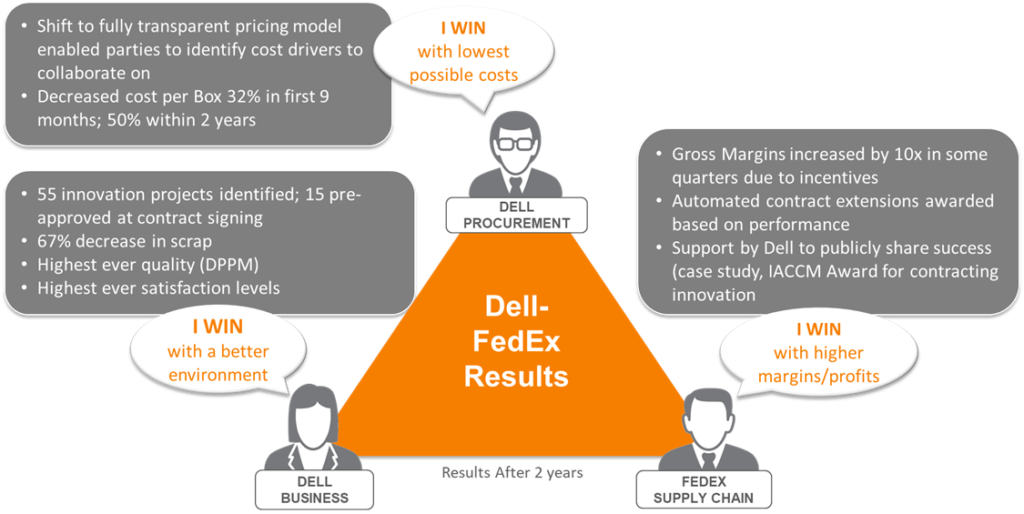
The post Dell – FedEx Supply Chain (formerly GENCO) appeared first on Vested.
Island Health – Hospitalists 28 Apr 2024 3:38 PM (last year)
Canada’s Vancouver Island Health Authority (Island Health) provides health care services through a network of hospitals, clinics, health units, community-based services, home support, and residential care centers for over 767,000 people throughout Vancouver Island and surrounding areas. Island Health pioneered in developing a Hospitalist service in British Columbia in 2000, establishing a small group of Hospitalists to work at two hospitals. However, enthusiasm for the practice waned each time the Island Health Administrators and the Hospitalists met to renew their contract.
Between 2000 and 2014 Island Health and the Hospitalists had gone through contentious contract negotiations four times. When their fourth contract expired on June 30, 2014, neither side was optimistic about how negotiations would proceed. Both parties recognized the critical need to build a new relationship and made changes in personnel in the fall of 2015 to get the relationship back on track. But the relationship was so broken that contract negotiations went into a standstill; neither side knew how to proceed. Simply put, both sides were stuck.
Kim Kerrone, Island Heath’s Vice-President, Chief Financial Officer, Legal Services & Risk attended a presentation on the Vested business model and thought “Could Vested be applied to the Island Health and Hospitalists’ relationship to get them unstuck?”
Kerrone went back to Island Health Administrators and Hospitalists and recommended they look into the Vested collaborative model. Both parties agreed to send key leaders and stakeholders, including 12 Island Health Administrators and nine Hospitalists, to a three-day “Alignment Workshop” on May 30, 2016 to explore if Vested would be a good fit for their relationship and to align on a Statement of Intent for the relationship. The workshop was a turning point for the parties – with the decision to use the Vested methodology to help them shift from an arms-length transactional agreement to a highly collaborative and transparent Vested agreement.
The results were nothing short of a stunning turnaround in the health of the relationship.
To view the complete Case Study, please click this link.
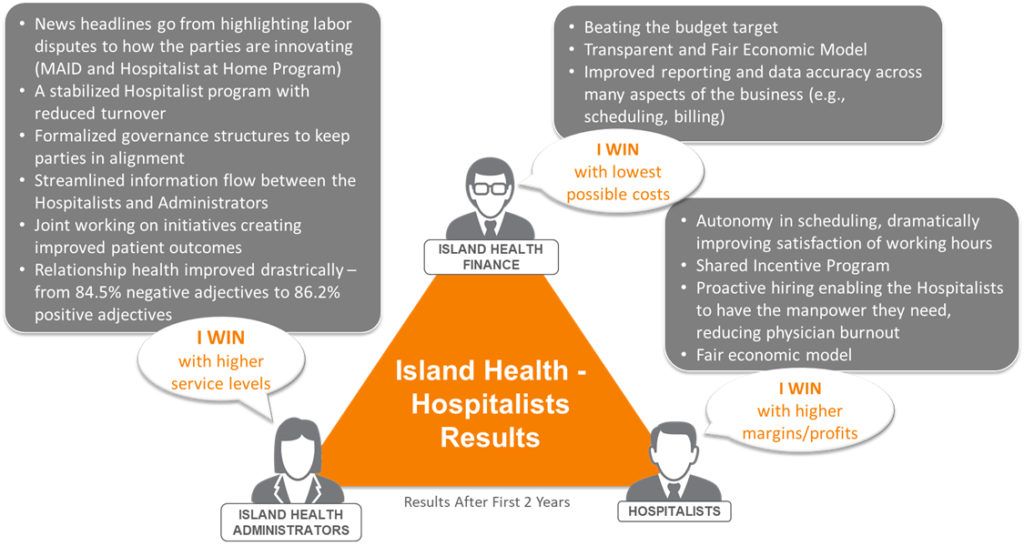
The post Island Health – Hospitalists appeared first on Vested.
Discovery Health 28 Mar 2024 3:25 PM (last year)
The healthcare market in South Africa – like most countries – is dynamic and evolving. Discovery Health launched what would become one of the most progressive insurance platforms for individuals and employers to fund medical treatment (called a Medical Scheme in South Africa). In 1998 South Africa passed the Medical Schemes Act to regulate the industry. The Act required medical schemes to become non-profit entities governed by an independent board of trustees. To comply with the Act, Discovery Health split into two entities: The Discovery Health Medical Scheme (the Scheme) and Discovery Health (Pty) Limited (DH), a medical scheme administrator. The Scheme ultimately contracted with DH to provide administration and managed care services as an outsourced service provider.
When Milton Streak joined the Scheme in 2009 as the Principal Officer, he immediately realized the strong collaboration between the Scheme and DH was as a source of the Scheme’s competitive advantage. There was no doubt the Scheme had an excellent working relationship with Discovery Health. As the Principal Officer, Milton Streak knew the Scheme would need to dig deeper into best practices for outsourced contracts. His research led him to the University of Tennessee’s research on Vested outsourcing for creating highly collaborative win-win relationships.
In 2015, the Scheme’s Board of Directors commissioned a formal review of the relationship and contract, engaging Dr. Andrew Downard. The report was very positive; indeed, the Scheme and DH had set up an excellent outsourcing contract producing solid results – with one caveat: the parties failed to incorporate the very successful relational aspects into their contract – a hallmark of a true Vested relationship.
The review triggered the Scheme and DH to restructure their existing contract to include the formal aspects of a relational contract, incorporating the intent and collaborative governance mechanisms. The impact was taking an already good relationship to a great relationship. The journey to a Vested agreement required documenting the overall intent of the relationship, incorporating the softer aspects of the relationship that were a genuine source of success, and creating formal governance mechanisms to keep the parties aligned over time.
The results were exceptional. Under the leadership of Streak and his counterpart at DH – Dr. Jonny Broomberg, DH’s CEO – the duo grew the Scheme to South Africa’s largest open medical scheme, documenting dozens of innovations, and leading to lower costs and improved services and product offerings. To view the complete Case Study, please click this link.
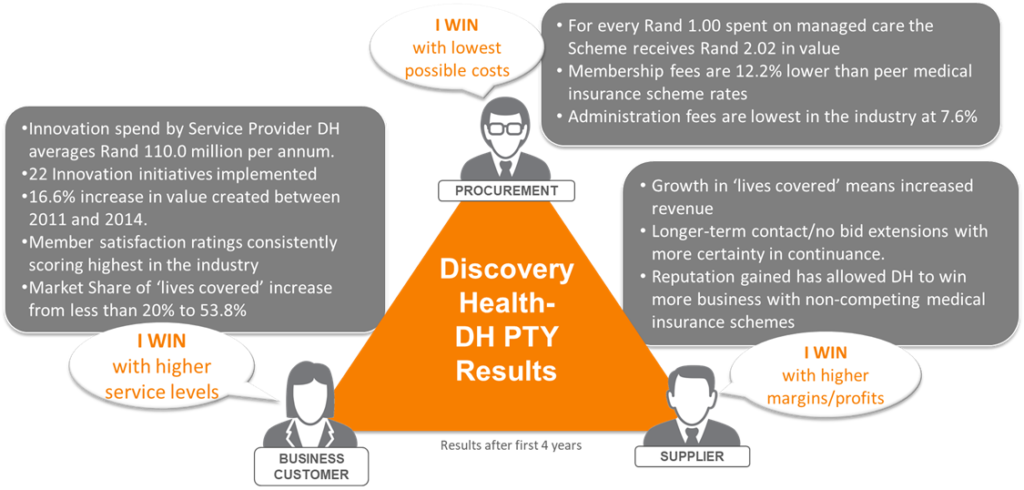
The post Discovery Health appeared first on Vested.
Telecommunications – Technical Maintenance 28 Feb 2024 3:24 PM (last year)
The buying company is a key leader in telecommunications in Europe (referred to TelCo). TelCo began their Vested journey like most organizations: wanting to understand if making the shift to a highly collaborative Vested relationship is worth the effort. Today TelCo has five Vested agreements.
TelCo’s Vested initiative started as a pilot to see if the Vested model could work to streamline the maintenance for its thousands of technical sites including cell towers. TelCo kicked off the Vested journey by having EY, a Vested Center of Excellence, conduct a six-week “pre-study” that included over 20 different functions within TelCo. The pre-study revealed several key things. First TelCo’s numerous contracts were rooted in transaction-based models, which created a misalignment of goals. TelCo had “stiff contracts” that were not flexible in allowing suppliers to optimize maintenance operations.
TelCo’s leadership team decided to formally approve the pilot. The Vested journey – facilitated by EY and Cirio law firm – included 17 highly interactive workshops where TelCo and their supplier co-created how they would follow the Vested Five Rules. The process took eight months (including vacation breaks). TelCo inked their Vested agreement in April 2017.
Under the Vested agreement the supplier is rewarded for making investments in the relationship that help TelCo and the supplier achieve mutually defined Desired Outcomes. A supplier executive commented: “Under the pricing model, we make less profit on base services. However, we have the potential to earn above market profit margins on our project/transformation initiatives. Shifting to Vested means we (both TelCo and the supplier) now look at the financials across the whole portfolio of business together and not just the price of individual projects or services. We are now making much smarter and collaborative business decisions that ultimately motivate TelCo to make investments that will have a high ROI for both parties.”
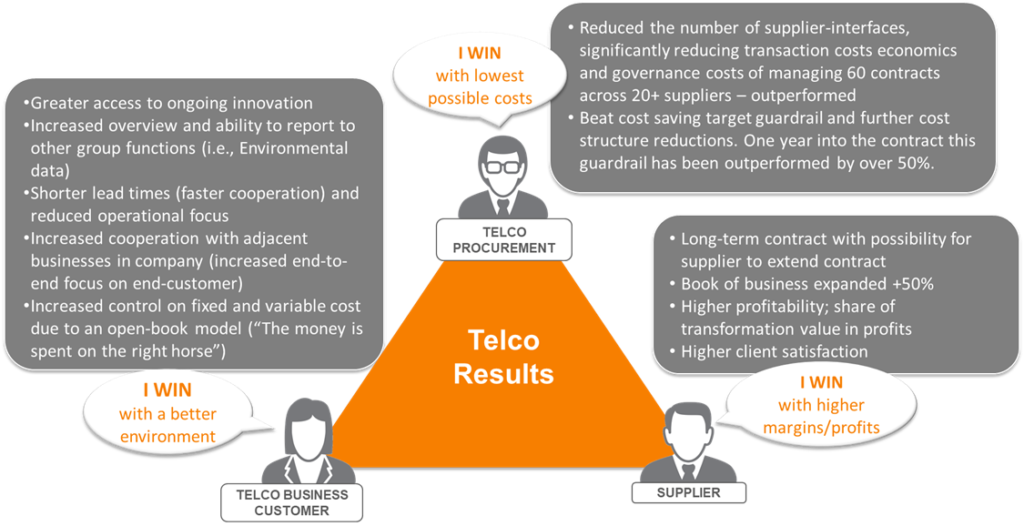
The post Telecommunications – Technical Maintenance appeared first on Vested.
Healthcare – Facilities Management 30 Jan 2024 3:23 PM (last year)
The buying company (HealthcareCo) is one of the world’s largest and most broadly based healthcare companies with products spanning both pharmaceutical and consumer products. The service provider (Supplier) is a global leader in quality-of-life services and is considered one of the top 25 employers in the world. Their relationship spans more than 25 years.
In 2013, the HealthcareCo set out to create a more “strategic” approach, by shifting to an integrated facilities management (IFM) solution. It expanded locations across ten countries in the Europe, Middle East and Africa (EMEA) region, including the United Kingdom, Italy, Germany and Belgium. From a commercial perspective, the parties shifted risk to the Supplier for performance against pre-defined service level agreements (SLAs) at a set budget, and signed a GMP (gross maximum price) performance-based pricing model.
In the spring of 2015, with the current contract nearing its expiration date, HealthcareCo beganto consider how it could further mature its outsourcing efforts and was in the process of creating a Request for Proposal to go back to the market. It was during this period that HealthcareCo stumbled across the work of the University of Tennessee on the Vested business model. The parties engaged a Vested Center of Excellence to conduct a Deal Review to see if restructuring their existing agreement to a win-win Vested business model could unleash the desired innovation HealthcareCo was seeking.
The Deal Review was a turning point for both parties. It was clear the business model was ripe for reinvention. Ultimately, for the next nine months, the parties set out to totally restructure their relationship and contract, using the UT’s Vested methodology. The companies worked with a Vested Center of Excellence to provide coaching and legal support during their Vested journey to transform their partnership. After a series of 20 facilitated workshops HealthcareCo and Supplier signed Europe’s first Vested Agreement for Integrated Facilities Management (IFM) in February 2017. The contract spanned 153 sites in 29 countries across EMEA, and included 11 core services and 49 sub-services. It involved 2000 Supplier employees supporting 44,000 Buyer employees in 32 languages.
By 2020 the parties had a complete turnaround in the health of the relationship, with a formal Health Check rating score increasing from only 58% in 2016 to over 90% after making the shift under the Vested agreement.

The post Healthcare – Facilities Management appeared first on Vested.
Telenet and Solutions 30: Transforming Telecom Service Operations to Deliver Innovation 29 Dec 2023 7:42 AM (last year)
In 2016 Telenet – Belgium’s second largest telco provider – found itself in a fast-changing Telecom world. Senior executives chartered a task force to embark on a six-month effort to review the changing landscape of how increased commoditization and digitization would impact how Telenet operated. This strategic review also included assessing core competencies and determining what areas to consider for more strategic outsourcing.
One area that came under scrutiny was how Telenet approached its network operations. Micha Berger, CTO of Telenet, clearly remembers the dilemma. “Field Services was considered a valuable asset for Telenet, but Telenet did not have the flexibility or company culture to grow this part of the business or to provide technicians the opportunity to expand their careers.” After the six months of soul searching one thing was clear: doing business the way it had always been done would no longer work. Telenet would need to transform and change how it worked so they could fund the additional investments needed to continue to lead the market and fuel its cycle of sustainable growth.
By the end of 2016, Telenet executives decided to go to market with a tender process to find a strategic partner that could help them transform their network operations. What started with a tender process with 14 potential suppliers ended in December 2017 with Telenet formally selecting Solutions 30 as their partner of choice with the goal to create a Vested agreement. The parties signed Belgium’s first Vested outsourcing agreement in July 2018.
By the end of 2021 Telenet and Solutions 30 had been working under a Vested model for just over three years with significant success. John Porter, the CEO of Telenet, is glad the parties took a path to a Vested partnership: “Putting together the partnership with Solutions 30 in 2018 is one of the best things we have done. The partnership enables Telenet to accelerate the delivery of differentiated customer value propositions and an outstanding user experience.” The below “performance pyramid” shares some high-level results.
To view the complete Case Study, please click this link.
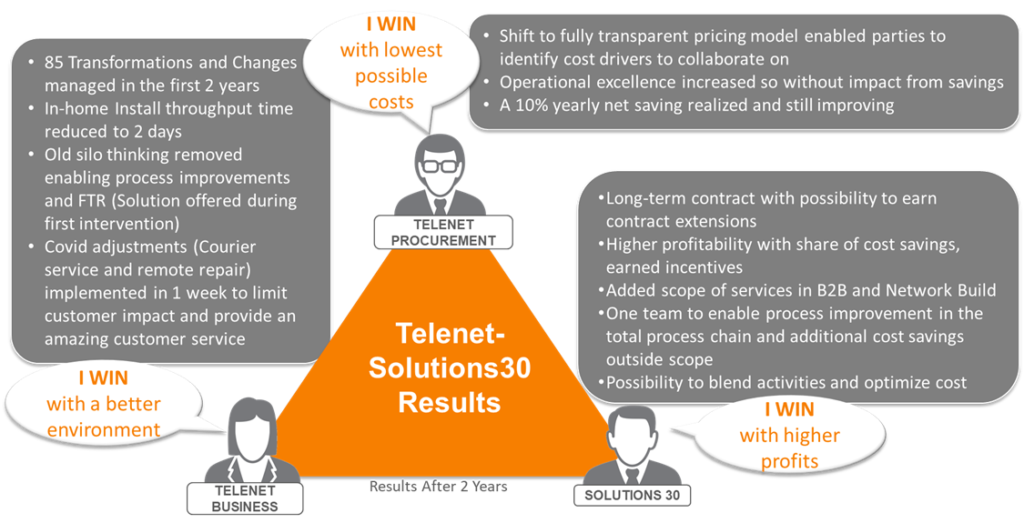
The post Telenet and Solutions 30: Transforming Telecom Service Operations to Deliver Innovation appeared first on Vested.
BP and JLL: Reimagining Real Estate and Facilities Management Outsourcing 1 Dec 2023 2:40 PM (last year)
Since its inception in 1908 the bp story has always been about transitions. bp’s purpose is reimagining energy with a big hairy audacious goal to help the world reach net zero emissions by 2050 and improve people’s lives. bp plans to get there by dramatically reducing carbon in bp’s operations and production facilities and by growing new low-carbon businesses, products and services.
Jones Lang LaSalle (JLL) is a world leader in real estate and facility management services with roots back to 1783. Like bp, the ability to effectively transform throughout the years has been a cornerstone of its success. JLL’s purpose is to “shape the future of real estate for a better world.” Today, JLL’s operations span 91 countries where they manage over 4.6B square feet of owned property and an additional 1B in leased facilities.
The transformation of bp’s facilities and real estate contracts began when Wendy Cuthbert – bp Global Head of Workplace Solutions – joined bp in the fall of 2019. bp’s total facilities management portfolio includes over 130 locations in 20 countries. In 2019 they had four “primary” suppliers operating around the world with one working under a performance-based agreement and the others being transactional.
After joining bp, Wendy encouraged bp’s RE/FM leaders to explore the University of Tennessee’s (UT) Vested methodology. bp engaged UT to host three regional workshops where key bp real estate and facilities management team members could do a deeper dive on Vested.
Wendy explains the impact of the workshops: “The workshops helped team members take the Vested theory and see how it could work with what bp wanted to do. I remember the team had to complete some self-assessments. We scored ourselves against the ‘12 Ailments of Outsourcing’ as well as how well our contracts followed the Vested Five Rules. The team would see the gaps and use the workshop time to understand how the Vested methodology could help bp close the gaps.”
In the spring of 2020, bp made the strategic decision to create a Vested agreement and ultimately sought the best supplier from the three down-selected candidates. JLL was ultimately selected as the partner of choice the first week of June 2020 with the goal to work with bp to reimagine workplace solutions across the globe. They signed their Vested agreement in November 2021 – the first Vested agreement for bp and the third for JLL.
To view the complete Case Study, please click this link.
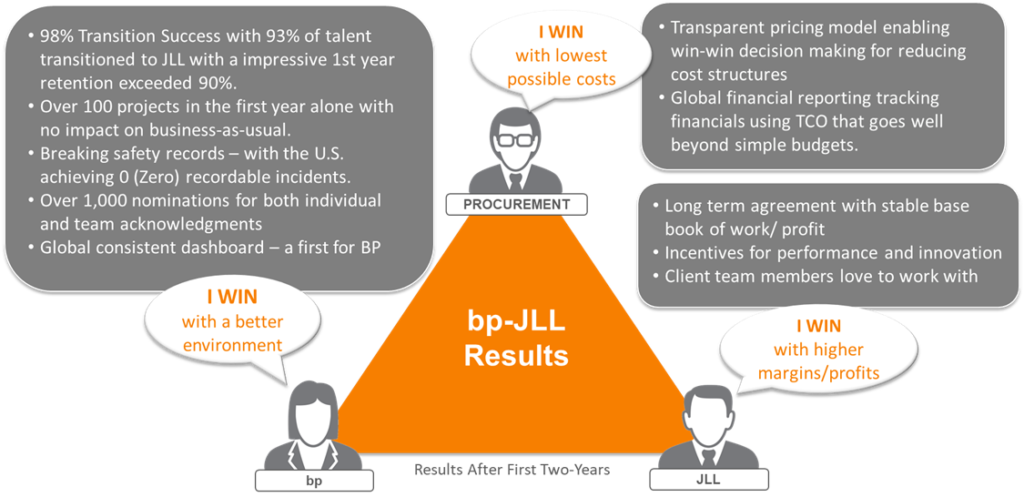
The post BP and JLL: Reimagining Real Estate and Facilities Management Outsourcing appeared first on Vested.
The Rise of Outcome-based Management Approaches 30 Aug 2022 10:57 AM (3 years ago)

“Outcome-based” has become a buzzword for business leaders. Jennifer Robison, senior editor for Gallup, summarized why in a recent article.
The findings are similar to my work at the University of Tennessee in that managers who focus on outcomes have positive results for the business and its employees.
But here is the punchline. Making the shift to an outcome-based approach is hard. And it is not for everyone. The article shares a key fact: making the shift to an outcome-based approach requires collaboration, trust and autonomy. Robison said: “Leaders define outcomes and, along with managers, set parameters and guidelines. Employees, then, have a high degree of autonomy to use their own unique talents to reach goals their own way.”
The article continues that for outcome-based approaches to work, a “specific type of culture” is required, one supported by talent selection, management that engages employees and the smart application of employees’ talents to their roles.
Is an outcome-based approach an invitation to chaos? That is a danger, but I’ve seen firsthand how the payoff is substantial if you can get it right. Need some proof to “see” the potential? Pick up a copy of my book Vested: How P&G, McDonald’s and Microsoft are Redefining Winning in Business Relationships. While those behemoth organizations make headlines in the title, I profile eight of my favorite case studies including two government examples, one non-profit example and even one small business. The results are real and I encourage you to read the stories to get a feel for the art of the possible.
While my book shares quantitative results from organizations making the shift, Robison’s article points to an intangible benefit in that executives “get more time to concentrate their talents on setting and articulating vision, direction and goals, while trusting that the work will get done well and efficiently.”
Of course, if you don’t feel comfortable with collaboration, trust and autonomy then stick with the status quo transactional way of working.
The post The Rise of Outcome-based Management Approaches appeared first on Vested.
Forbes — 16 August 2022 — Content creators and business partnerships 16 Aug 2022 8:25 AM (3 years ago)
Article by Kate Vitasek published in Forbes on 16 August 2022.
Content Creators And Business Partnerships: Collaboration And Integration Mean Success.
The post Forbes — 16 August 2022 — Content creators and business partnerships appeared first on Vested.
When is it okay to lie? 12 Aug 2022 9:56 AM (3 years ago)

That’s a sticky question, especially in 2022 business environments marked by mounting economic uncertainties, talent issues, and struggling post-pandemic supply chains. So, is the answer Never? Sometimes? It depends?
“There’s a universe of ambiguity between outright fraud and the whole truth,” says John Paul Rollert in an article published in 2020. It’s ambiguous because while few business executives are willing to dismiss a commitment to the truth outright, “for most people today, an affirmative fidelity to the truth seems a better fit for Boy Scouts than business executives.”
Rollert cites the work of the economist Albert Z. Carr in the 1960s. Carr said: “Most executives from time to time are almost compelled, in the interests of their companies or themselves, to practice some form of deception when negotiating with customers, dealers, labor unions, government officials, or even other departments of their companies. By conscious misstatements, concealment of pertinent facts, or exaggeration—in short, by bluffing—they seek to persuade others to agree with them. I think it is fair to say that if the individual executive refuses to bluff from time to time—if he feels obligated to tell the truth, the whole truth, and nothing but the truth—he is ignoring opportunities permitted under the rules and is at a heavy disadvantage in his business dealings.”
What Carr says is unfortunate but true and perhaps one reason why transparency has become such a prevalent buzzword in business negotiation. It’s also a conundrum because if both sides are bluffing in a negotiation where does that leave truth, the deal, and integrity?
The post When is it okay to lie? appeared first on Vested.